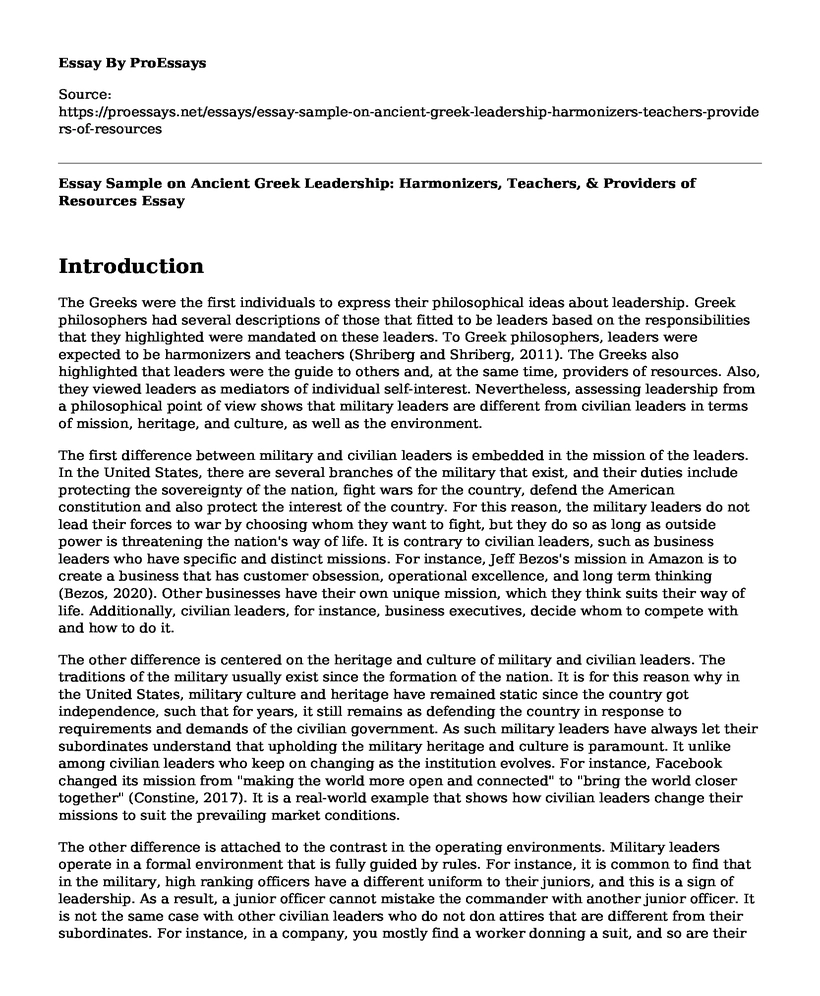Introduction
The Greeks were the first individuals to express their philosophical ideas about leadership. Greek philosophers had several descriptions of those that fitted to be leaders based on the responsibilities that they highlighted were mandated on these leaders. To Greek philosophers, leaders were expected to be harmonizers and teachers (Shriberg and Shriberg, 2011). The Greeks also highlighted that leaders were the guide to others and, at the same time, providers of resources. Also, they viewed leaders as mediators of individual self-interest. Nevertheless, assessing leadership from a philosophical point of view shows that military leaders are different from civilian leaders in terms of mission, heritage, and culture, as well as the environment.
The first difference between military and civilian leaders is embedded in the mission of the leaders. In the United States, there are several branches of the military that exist, and their duties include protecting the sovereignty of the nation, fight wars for the country, defend the American constitution and also protect the interest of the country. For this reason, the military leaders do not lead their forces to war by choosing whom they want to fight, but they do so as long as outside power is threatening the nation's way of life. It is contrary to civilian leaders, such as business leaders who have specific and distinct missions. For instance, Jeff Bezos's mission in Amazon is to create a business that has customer obsession, operational excellence, and long term thinking (Bezos, 2020). Other businesses have their own unique mission, which they think suits their way of life. Additionally, civilian leaders, for instance, business executives, decide whom to compete with and how to do it.
The other difference is centered on the heritage and culture of military and civilian leaders. The traditions of the military usually exist since the formation of the nation. It is for this reason why in the United States, military culture and heritage have remained static since the country got independence, such that for years, it still remains as defending the country in response to requirements and demands of the civilian government. As such military leaders have always let their subordinates understand that upholding the military heritage and culture is paramount. It unlike among civilian leaders who keep on changing as the institution evolves. For instance, Facebook changed its mission from "making the world more open and connected" to "bring the world closer together" (Constine, 2017). It is a real-world example that shows how civilian leaders change their missions to suit the prevailing market conditions.
The other difference is attached to the contrast in the operating environments. Military leaders operate in a formal environment that is fully guided by rules. For instance, it is common to find that in the military, high ranking officers have a different uniform to their juniors, and this is a sign of leadership. As a result, a junior officer cannot mistake the commander with another junior officer. It is not the same case with other civilian leaders who do not don attires that are different from their subordinates. For instance, in a company, you mostly find a worker donning a suit, and so are their managers.
Conclusion
In my opinion, I think that military leaders have an advantage over civilian leaders due to the structure and recognizable uniform. The military is built with bureaucracy and emphasis on respect. It is for this reason why junior officers even salute when in the presence of their seniors. On the other hand, most organizations are built with an emphasis on teamwork and interaction, and this makes leaders in this environment look like their juniors, and this makes their work harder. The fact that you cannot distinguish them from their juniors through their uniform even makes their job harder compared to their military counterparts who are easily distinguishable through their uniforms.
References
Bezos, J. (2020). Amazon Mission, Vision & Values. Retrieved 10 March 2020, from https://www.comparably.com/companies/amazon/mission
Constine, J. (2017). Facebook changes the mission statement to 'bring the world closer together'. Retrieved 10 March 2020, from https://techcrunch.com/2017/06/22/bring-the-world-closer-together/
Shriberg, D., & Shriberg, A. (2011). Practicing leadership: Principles and applications. New York: Wiley.
Cite this page
Essay Sample on Ancient Greek Leadership: Harmonizers, Teachers, & Providers of Resources. (2023, Apr 23). Retrieved from https://proessays.net/essays/essay-sample-on-ancient-greek-leadership-harmonizers-teachers-providers-of-resources
If you are the original author of this essay and no longer wish to have it published on the ProEssays website, please click below to request its removal:
- Project Management Essay
- Paper Example on Personal Decision Making Model
- My Main Goal and Necessary Steps Toward Achieving It: To Become a Chief Executive Officer
- Entrepreneurship: Why Mentoring Is Important Essay Example
- Essay Sample on Strategic Management: Achieving Goals & Objectives for Optimal Performance
- Essay Example on the Cold War: A Conflict Between Two Superpowers
- Paper Example on Reforming Complaints Processes: Involving HR for Positive Outcomes







